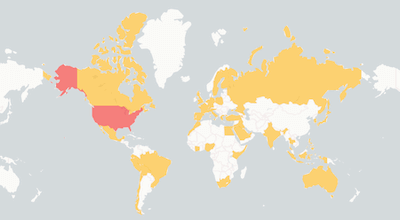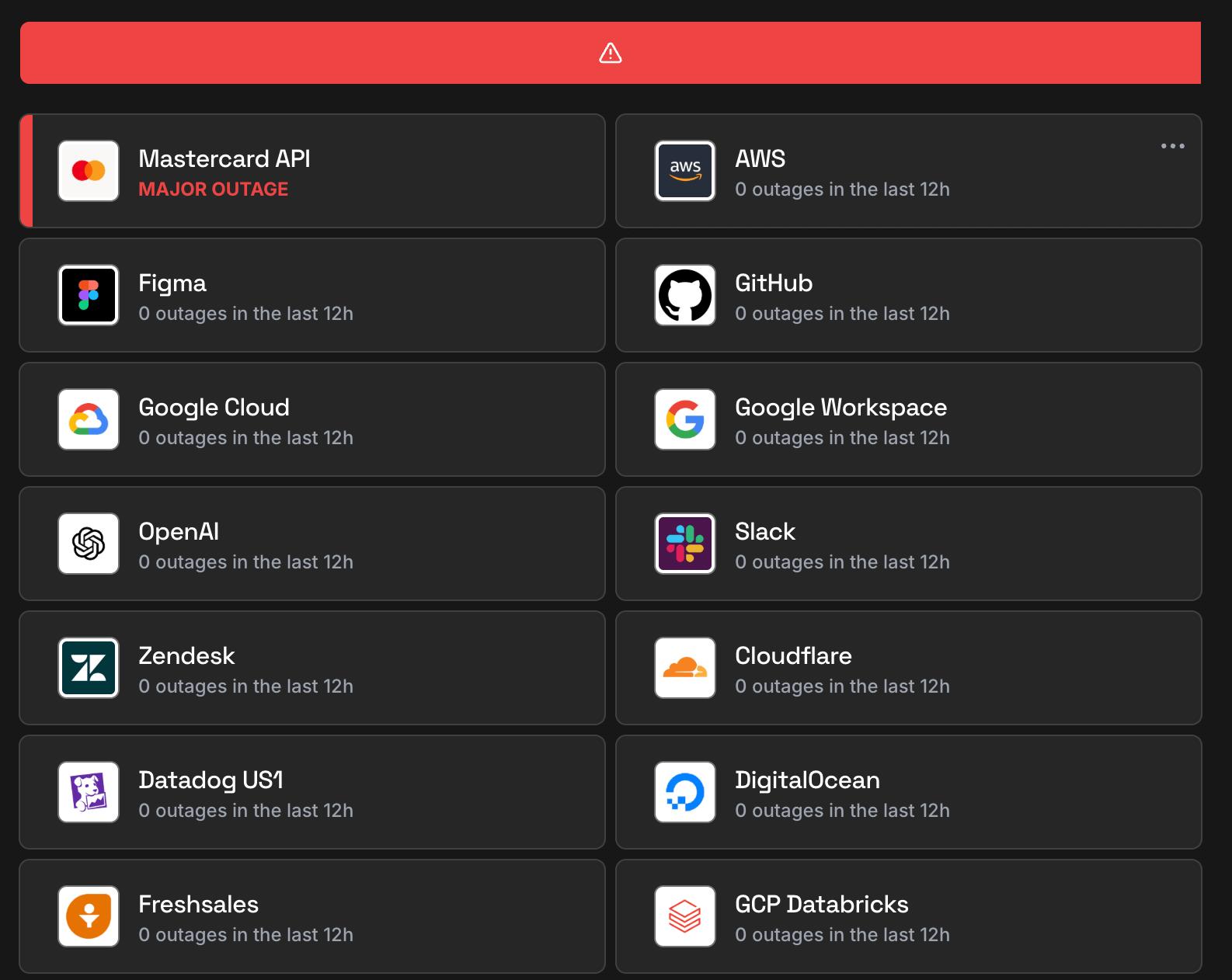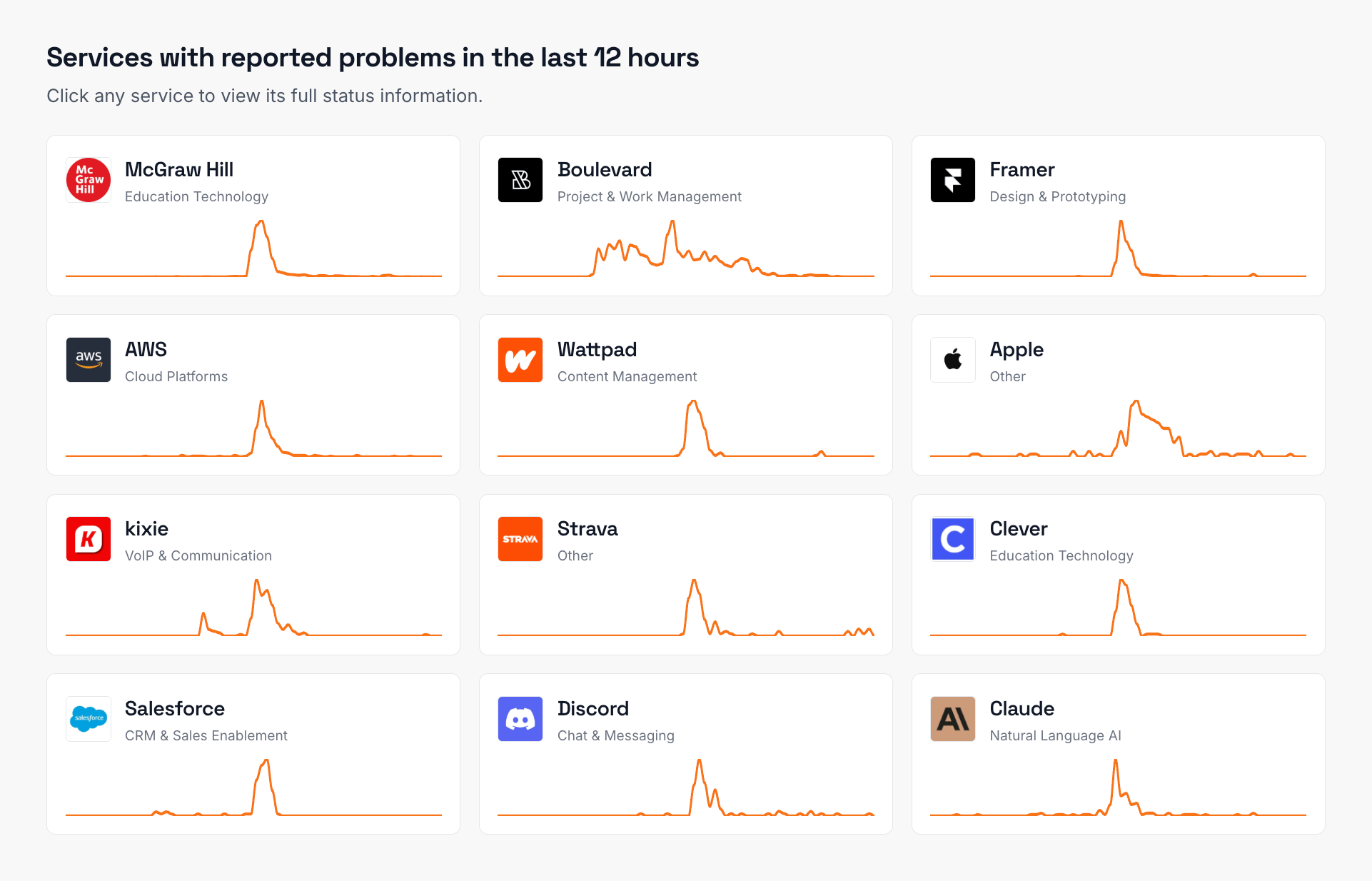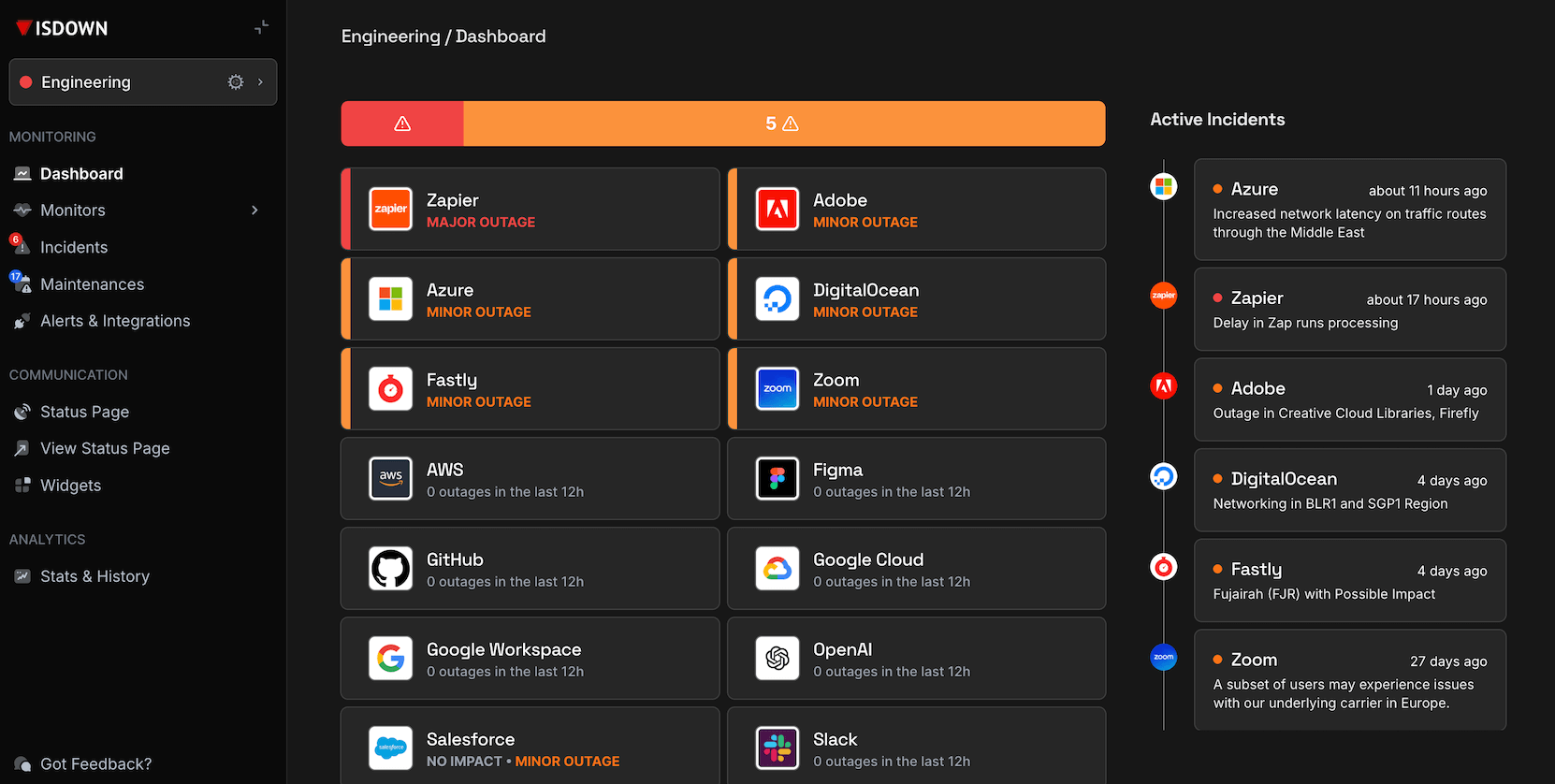Is MongoDB Down? MongoDB Status & Outages
MongoDB status updated
What is MongoDB status right now?
MongoDB is having a major outage
MongoDB service health over the last 24 hours
This chart shows the number of user-reported issues for MongoDB service health over the past 24 hours, grouped into 20-minute intervals. It's normal to see occasional reports, which may be due to individual user issues rather than a broader problem.
Outage Map

See where users report MongoDB is down. The map shows recent MongoDB outages from around the world.
MongoDB Outage Map
MongoDB Downtime Health — Last 90 Days
In the last 90 days, MongoDB had 14 incidents (7 major outages and 7 minor incidents) with a median duration of 1 hour 57 minutes.
Incidents
Major Outages
Minor Incidents
Median Resolution
Recent MongoDB outages detected by IsDown
Full incident reports for recent MongoDB outages, including timelines, affected components, and resolution details.
| Title | Started At | Duration |
|---|---|---|
|
We are currently investigating this issue.
Some users may not be receiving emails from MongoDB. W...
|
Mar 02, 2026 at 03:50 PM UTC
|
about 1 hour |
|
Impact: Some Atlas customers with deployments in the AWS me-central-1 (United Arab Emirates) regi...
|
Mar 01, 2026 at 01:48 PM UTC
|
Ongoing |
|
We are currently investigating an issue with Atlas App Services Device Sync. Affected users of th...
|
Feb 28, 2026 at 07:53 PM UTC
|
1 day |
|
We are currently experiencing degraded service with our DataDog integration for several DataDog r...
|
Feb 26, 2026 at 07:21 PM UTC
|
44 minutes |
|
We are investigating reports of Atlas Data Federation and Online Archive schema tables failing to...
|
Feb 19, 2026 at 06:50 PM UTC
|
about 22 hours |
|
We are investigating an issue with DNS resolution for public IP addresses within 31.89.0.0/24. W...
|
Feb 13, 2026 at 04:11 PM UTC
|
about 2 hours |
|
We are currently investigating reports of the slow loading of the Atlas web UI.
|
Feb 13, 2026 at 07:20 AM UTC
|
36 minutes |
|
We are currently investigating elevated errors for customers attempting to create a cluster on AWS
|
Feb 12, 2026 at 10:10 PM UTC
|
about 1 hour |
|
We are observing widespread issues in Azure West US. Customers may see nodes reporting as “down” ...
|
Feb 07, 2026 at 09:07 AM UTC
|
about 3 hours |
|
Users may be unable to access the MongoDB Atlas App Services triggers page and may see authentica...
|
Feb 03, 2026 at 06:49 PM UTC
|
31 minutes |
MongoDB Components Status
Check if any MongoDB component is down. View the current status of 3 services and regions.
| Component | Status |
|---|---|
| MongoDB Cloud | OK |
| MongoDB Realm | OK |
| MongoDB Support Portal | OK |

MongoDB
+ 6,019 other services
Know the moment your vendors go down
Stop checking status pages manually. Get instant alerts to your team's tools.
14-day trial · No credit card · 5-min setup
About MongoDB Status and Outage Monitoring
IsDown has monitored MongoDB continuously since June 2021, tracking this Databases & Storage for 5 years. Over that time, we've documented 350 outages and incidents, averaging 6.3 per month.
We monitor MongoDB's official status page across 3 components. IsDown interprets MongoDB statuses (operational, degraded performance, partial outage, and major outage) to deliver precise health metrics and filter alerts by the components you actually use.
To check if MongoDB is down, IsDown combines official status data with user reports for early detection. Vendors often delay acknowledging problems, so user reports help us alert you before the official announcement.
Engineering and operations teams rely on IsDown to track MongoDB status and receive verified outage alerts through Slack, Teams, PagerDuty, or 20+ other integrations.
How IsDown Monitors MongoDB
IsDown checks MongoDB's status page every few minutes, across all 3 components. We combine official status data with user reports to detect when MongoDB is down, often before the vendor announces it.
When MongoDB status changes, IsDown sends alerts to your preferred channels. Filter by severity to skip noise and focus on outages that affect your business.

What you get when monitoring MongoDB with IsDown
Track MongoDB incidents and downtimes by severity
IsDown checks MongoDB official status page for major/minor outages or downtimes. A major outage is when MongoDB experiences a critical issue that severely affects one or more services/regions. A minor incident is when MongoDB experiences a small issue affecting a small percentage of its customer's applications. An example is the performance degradation of an application. The moment we detect a MongoDB outage, we send you an alert and update your dashboard and status page.
Get alerted as soon as users report problems with MongoDB
MongoDB and other vendors don't always report outages on time. IsDown collects user reports to provide early detection of outages. This way, even without an official status update, you can stay ahead of possible problems.
All the details of MongoDB outages and downtimes
IsDown collects all information from the outages published in MongoDB status page to provide the context of the outage. If available, we gather the title, description, time of the outage, status, and outage updates. Another important piece of information is the affected services/regions which we use to filter the notifications that impact your business.
Prepare for upcoming MongoDB maintenance events
MongoDB publishes scheduled maintenance events on their status page. IsDown collects all the information for each event and creates a feed that people can follow to ensure they are not surprised by unexpected downtime or problems. We also send the feed in our weekly report, alerting the next maintenances that will take place.
Only get alerted on the MongoDB outages that impact your business
IsDown monitors MongoDB and all their 3 components that can be affected by an outage. IsDown allows you to filter the notifications and status page alerts based on the components you care about. For example, you can choose which components or regions affect your business and filter out all other outages. This way you avoid alert fatigue in your team.
How IsDown Works
Get started in minutes. Monitor all your critical services from one place.
We monitor official status pages
IsDown checks the status of over 6,020+ services every few minutes. We aggregate official status information and normalize it, plus collect crowdsourced reports for early outage detection.
You get notified instantly
When we detect an incident or status change, you receive an alert immediately. Customize notifications by service, component, or severity to avoid alert fatigue.
Everything in one dashboard
View all your services in a unified dashboard or public or private status page. Send alerts to Slack, Teams, PagerDuty, Datadog, and 20+ other tools your team already uses.
No credit card required • 14-day free trial
MongoDB Downdetector vs IsDown
Looking for MongoDB outage alerts like Downdetector? IsDown monitors MongoDB's official status page for verified incident data, not just user reports. Know exactly when MongoDB is down, which components are affected, and when service health is restored. Here's why official MongoDB status monitoring beats crowdsourced detection:
| Features | IsDown | Downdetector |
|---|---|---|
| Official MongoDB status page monitoring. Know when MongoDB is down with real time incident details. | ||
| Monitor 6,020+ services including MongoDB in a single dashboard. | ||
| Instant MongoDB outage alerts sent to Slack, Teams, PagerDuty, and more. | ||
| Combined monitoring: MongoDB official status plus user reports for early outage detection. | ||
| Maintenance feed for MongoDB | ||
| Granular alerts filtering by MongoDB components and regions. |
14-day free trial • No credit card required
Frequently Asked Questions
Is MongoDB down today?
MongoDB is down. You can check MongoDB status and incident details on the top of the page. IsDown continuously monitors MongoDB official status page every few minutes. In the last 24 hours, there were 1 outages reported.
What is the current MongoDB status?
MongoDB seems to be having problems. You can check MongoDB status and incident details on the top of the page. The status is updated in almost real-time, and you can see the latest outages and issues affecting customers.
Is there a MongoDB outage now?
Yes, there is an ongoing outage. You can check the details on the top of the page.
Is MongoDB down today or just slow?
Yes, MongoDB might be slow as there's an ongoing outage. You can check the details on the top of the page.
How are MongoDB outages detected?
IsDown monitors the MongoDB official status page every few minutes. We also get reports from users like you. If there are enough reports about an outage, we'll show it on the top of the page.
Is MongoDB having an outage right now?
MongoDB last outage was on March 02, 2026 with the title "MongoDB Atlas: Email notifications may be failing"
How often does MongoDB go down?
IsDown has tracked 351 MongoDB incidents since June 2021.
Is MongoDB down for everyone or just me?
Check the MongoDB status at the top of this page. IsDown combines official status page data with user reports to show whether MongoDB is down for everyone or if the issue is on your end.
What MongoDB components does IsDown monitor?
IsDown monitors 3 MongoDB components in real-time, tracking the official status page for outages, degraded performance, and scheduled maintenance.
How to check if MongoDB is down?
- Subscribe (if possible) to updates on the official status page.
- Create an account in IsDown. Start monitoring MongoDB and get alerts in real-time when MongoDB has outages.
Why use IsDown to monitor MongoDB instead of the official status page?
Because IsDown is a status page aggregator, which means that we aggregate the status of multiple cloud services. You can monitor MongoDB and all the services that impact your business. Get a dashboard with the health of all services and status updates. Set up notifications via Slack, Datadog, PagerDuty, and more, when a service you monitor has issues or when maintenances are scheduled.
How IsDown compares to DownDetector when monitoring MongoDB?
IsDown and DownDetector help users determine if MongoDB is having problems. The big difference is that IsDown is a status page aggregator. IsDown monitors a service's official status page to give our customers a more reliable source of information instead of just relying on reports from users. The integration allows us to provide more details about MongoDB's Outages, like incident title, description, updates, and the parts of the affected service. Additionally, users can create internal status pages and set up notifications for all their third-party services.
Latest Articles from our Blog
Monitor MongoDB status and get alerts when it's down
14-day free trial · No credit card required · No code required
Get instant alerts when MongoDB goes down







